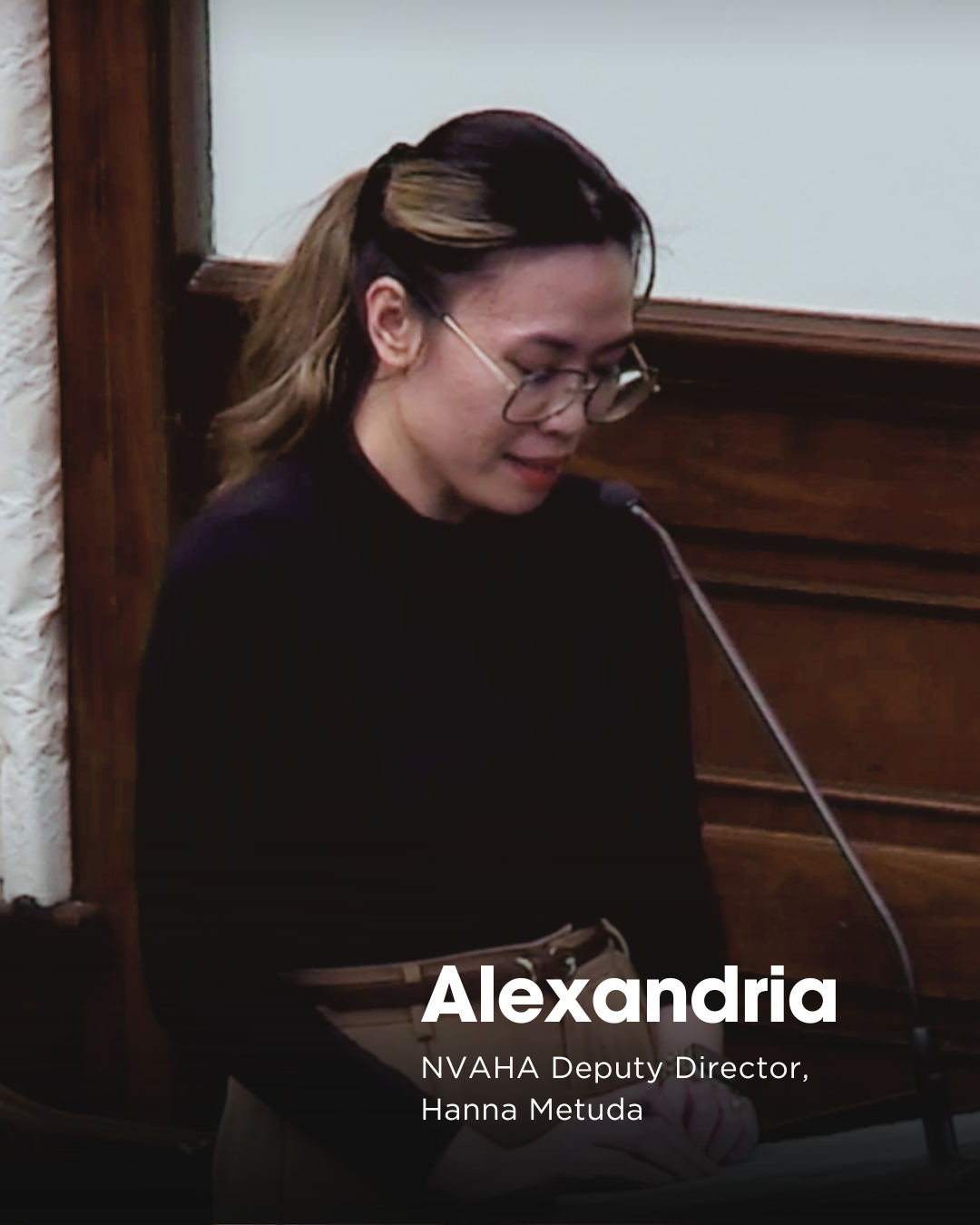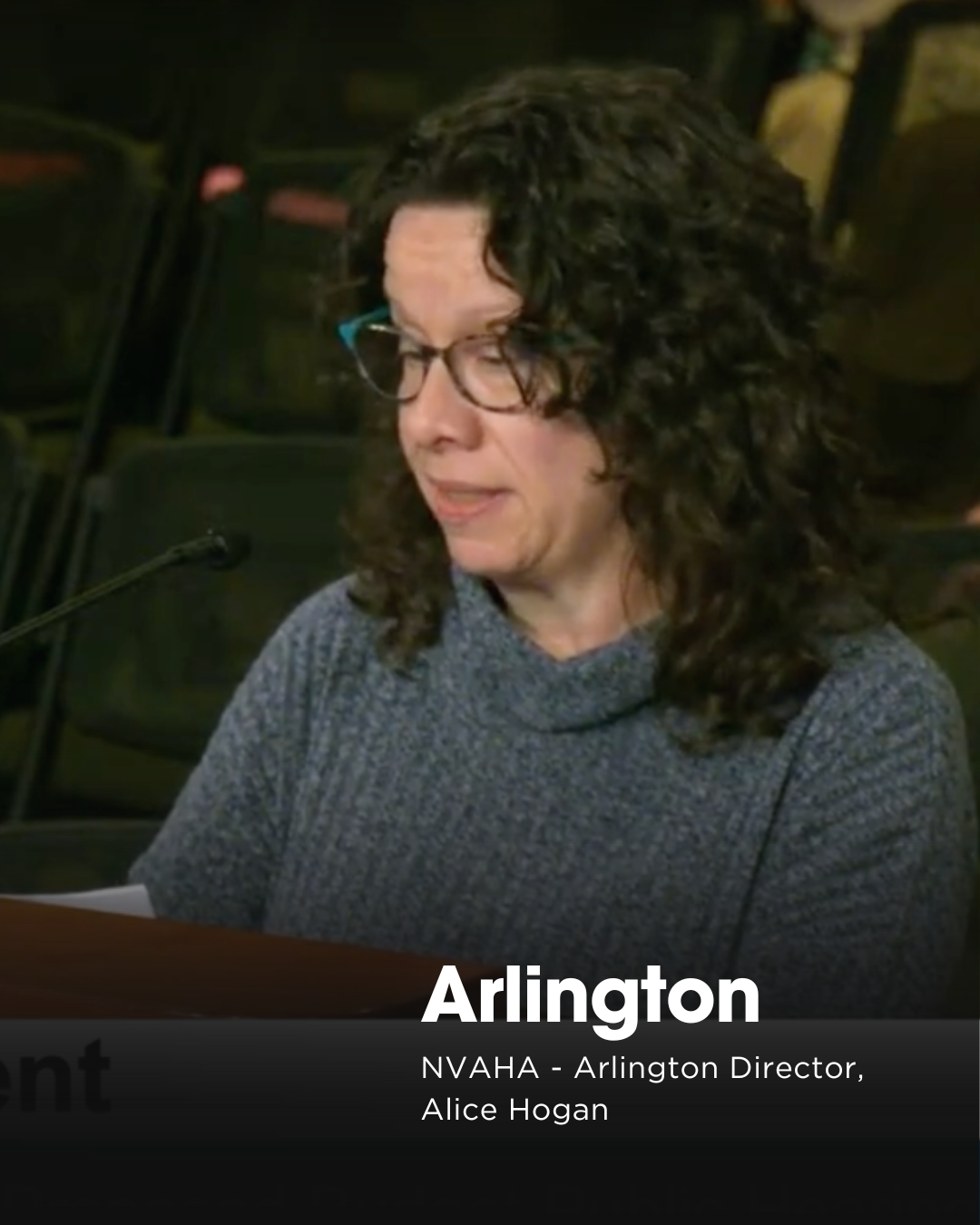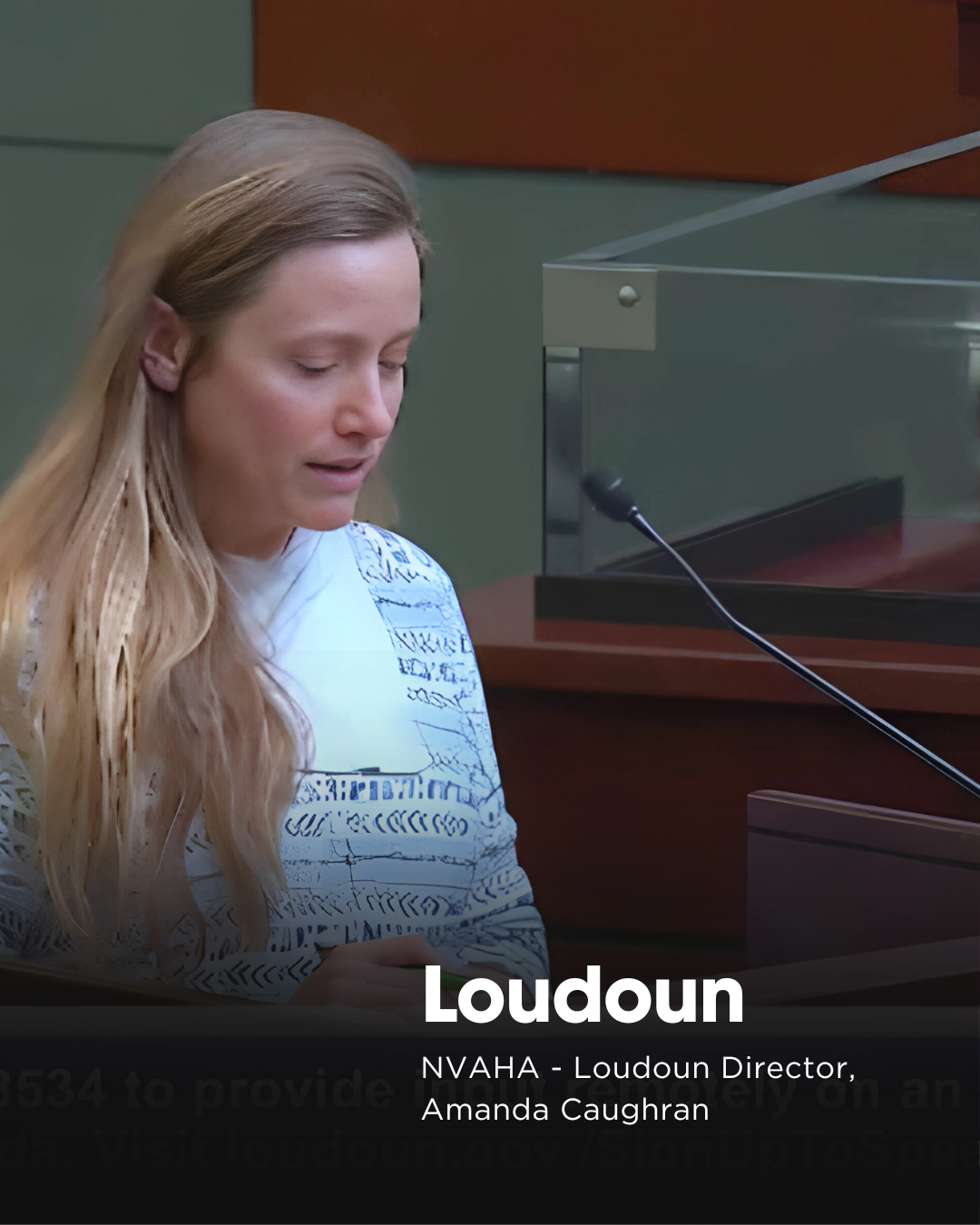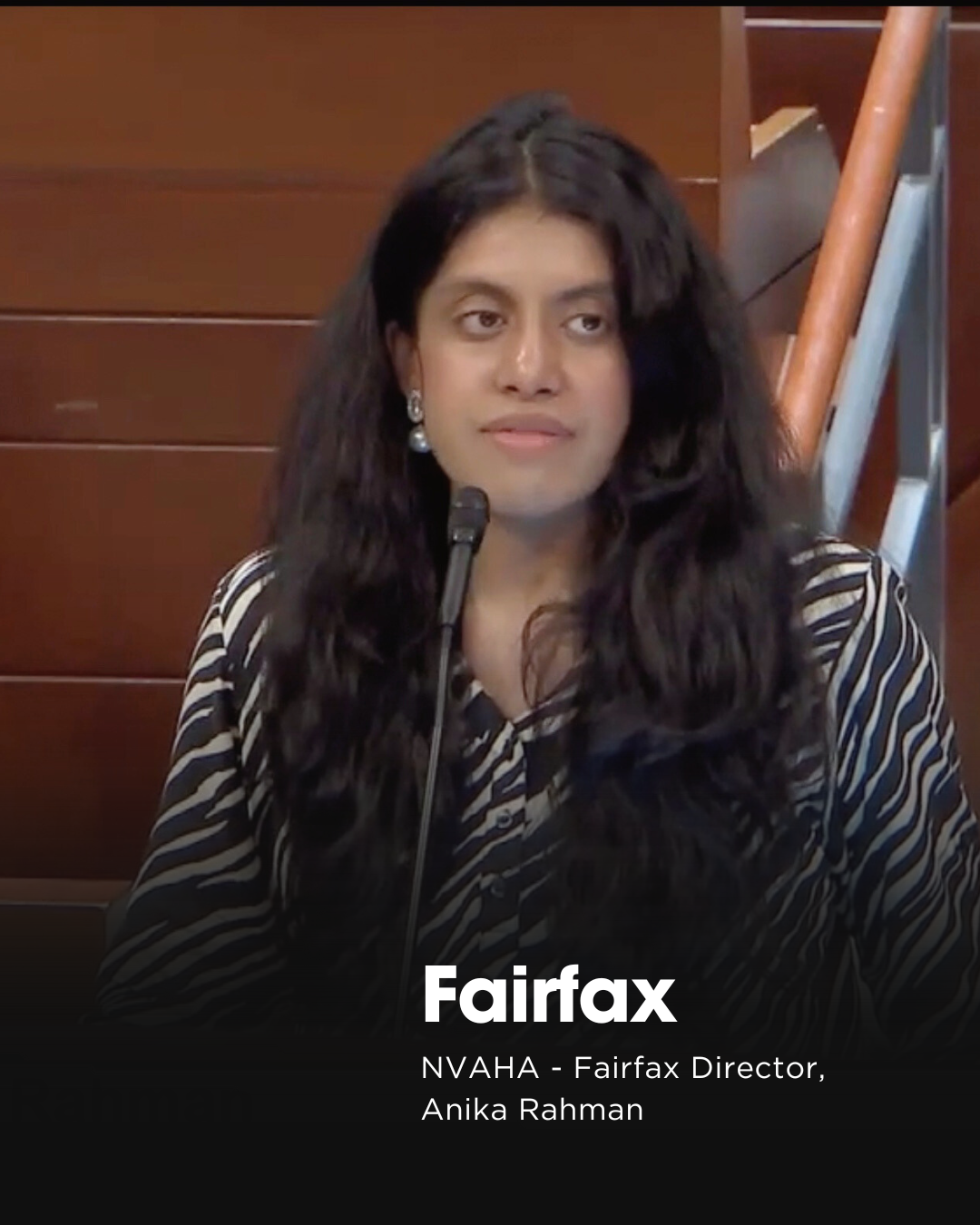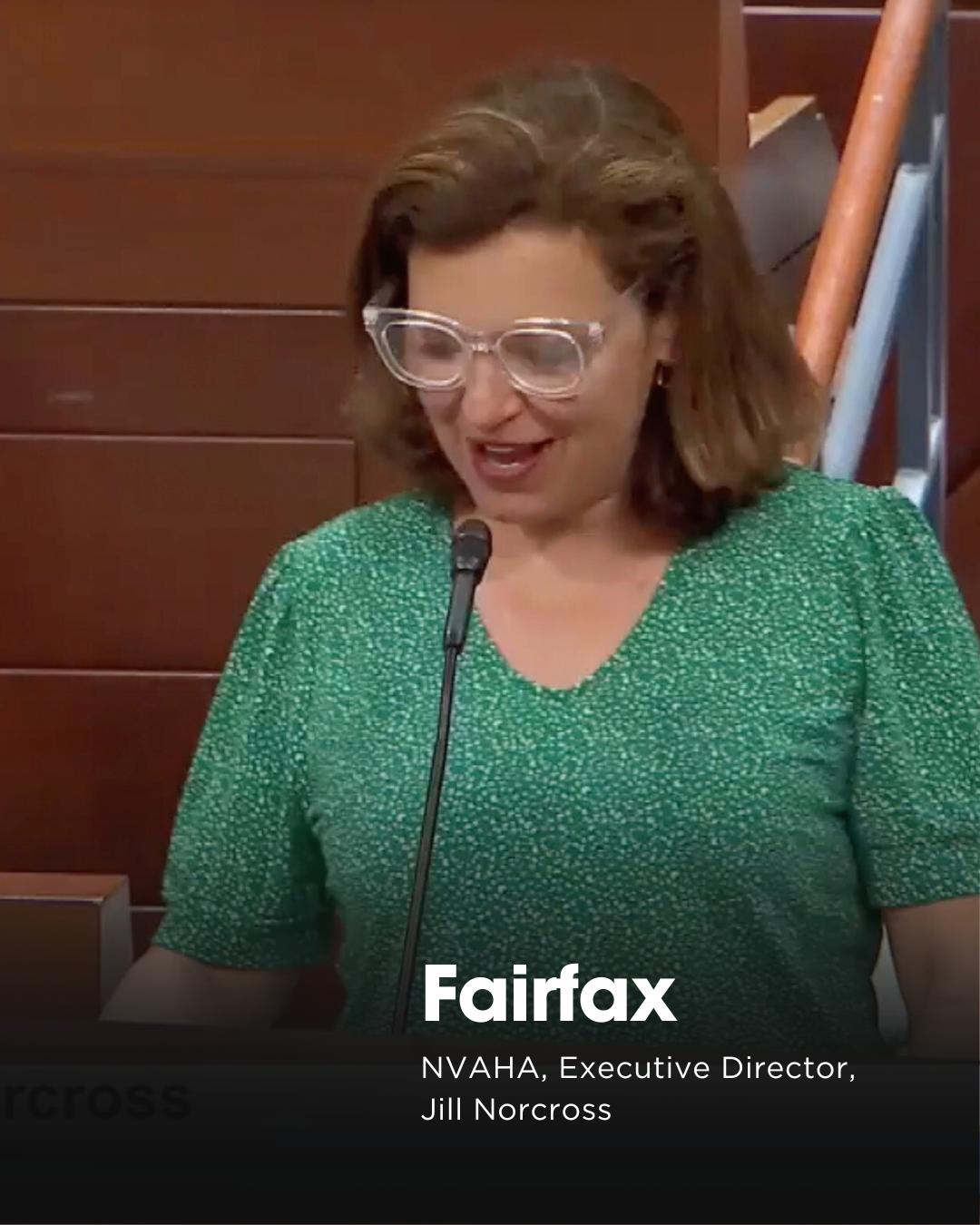|
|
This post was written by the NVAHA Team. |
|
Hi Friend,
This week, we wrapped up our state and local budget advocacy in support of affordable housing resources for FY2026. We wanted to highlight progress made in each of the jurisdictions and to share outcomes and next steps. Amid ongoing economic uncertainty, we saw that jurisdictions across Northern Virginia generally continued to prioritize funding for affordable housing and services.
This work doesn’t happen in a vacuum. Budget advocacy is complex, collaborative, and often incremental. It takes a wide network of partners who bring deep knowledge of their communities and shared commitments to advancing affordable housing. It is shaped by grassroots organizers, non-profit partners, and community advocates who lend their voices, testify at public hearings, and bring policy into focus. We’re proud to be in this work together with you.
To our advocacy partners—Arlington Community Foundation, Bu-GATA, Coalition for Smarter Growth, Community Foundation of Northern Fauquier and Loudoun Counties, Cornerstones, Fairfax Healthy Communities, HerndonOn, Loudoun Chamber of Commerce, Loudoun Housing Justice Coalition, NAACP Arlington, NAACP Fairfax, New Virginia Majority, Our Stomping Ground, RestonOn, Tenants and Workers United, Virginia Coalition for Immigrants’ Rights, Virginia Housing Alliance, Virginia Interfaith Center for Public Policy, Virginia Poverty & Law Center, VOICE, Wellington Development, and YIMBYs of NOVA - thank you!
We’re especially grateful to NVAHA’s Board of Directors and Leadership Council for their support and guidance throughout the year.
And finally, thank you to the many government staff, commission and board members, and elected officials who navigated a difficult budget season with care and commitment to core services. |
|
|
City of Alexandria
|
|
|
The City of Alexandria’s FY2026 Budget was adopted on April 30, with no changes to the real estate tax rate, which remains at $1.135 per $100 of assessed value. The budget includes $16.3M for housing, $4.8M from one-cent real estate tax set-aside, and $7.57M from Capital Improvement Program (CIP). Of that amount, $6.57M comes from the 1% meals tax dedication, and $1M additional cash capital. |
|
$11M of the FY26 Affordable Housing Fund budget, originally approved in FY23, was forward-allocated to the Sansé project by Housing Alexandria, where site work and infrastructure improvements are underway. The remaining housing funds will support programs such as homeownership assistance, landlord-tenant mediation, housing rehabilitation, and program administration.
Coming into this year’s budget season, we understood that this wasn’t the right moment to push for major new funding. With limited fiscal flexibility, we focused on protecting existing resources. Partnering with Tenants and Workers United, we advocated for the City to continue funding a rental subsidy program that was set to expire. As a result, the City Council approved $100,000 in ongoing funds for the Rental Subsidy Pilot Program, allowing approximately 10 additional low-income households to access stable housing.
Additional investments included $1.2M for school-based student and family support services, $120,500 to launch Healthy Homes programs addressing unsafe housing conditions, $25,000 to the Capital Area Food Bank, and $76,800 to expand after school programs for youth with disabilities.
Bottom Line: In a tight budget year, the City focused on preserving core services and meeting immediate needs. While key housing programs were sustained, no new local funds were allocated for affordable housing projects waiting in the pipeline. Without additional investments, the pipeline may continue to stall, underscoring the need for continued funding in the future and creative solutions to meet long-term housing goals. |
|
|
Arlington County
|
|
|
Arlington’s FY2026 Budget faced a $25M deficit and still managed to dedicate $101M to housing programs and services. That funding represents 6% of Arlington's overall budget, which was adopted on April 9, 2025. Property Tax Rates remained steady at $1.033 per $100 of assessed value, while the Meals Tax was increased from 4% to 5%. Housing-related funding increases resulted in $17.7M for Housing Grants and a new HG position; $7.1M for Permanent Supportive Housing; |
|
$7.2M for Shelter Services; $2.1M for Eviction Prevention; and $10K for Fair Housing Education & Enforcement.
The budget included the typical annual base funding of $9.7M for the AHIF (Affordable Housing Investment Fund), but no one-time funds were allocated to the AHIF, as is usually the case. Funds that could have gone to the AHIF (approximately $11M) were instead allocated to the County’s Stabilization Fund, now at $33M, reserving them for anticipated community needs in this increasingly gloomy economic and employment climate.
Bottom Line: Even in the context of a $25M budget deficit, County officials chose to protect vulnerable households as they anticipate the unknown ramifications of decreases in federal funding, employment shrinkage and any other economic and housing challenges that may result in both 2025 and 2026. Similar to COVID-era budgets, the FY26 budget is a cautious and protective budget that, while it does not fund additional affordable housing development or preservation, does seek to protect vulnerable populations in these uncertain times. |
|
|
Loudoun County
|
|
|
On April 1, the Loudoun County Board of Supervisors adopted the FY2026 budget, which will go into effect July 1, 2025. The budget totals approximately $4.7B in appropriations for the county government and school system. The adopted budget includes a real property tax rate of $0.805 cents per $100 in assessed value for FY26, which is 6 cents lower than the FY25 tax rate.
|
|
$17.3M, or the equivalent of a full penny of the real property tax, was allocated to the county’s Housing Fund. This is an increase from last year’s allocation of $7.4M, or the equivalent of a half cent of the real property tax. ($7.4M was allocated to the housing fund in January from FY25 surplus funds, doubling the FY25 investment and bringing it to $14.8M, or the equivalent of a full penny of the FY25 real property tax.) The FY26 budget includes funding for three new positions within DHCD, the Dept. of Housing and Community Development. $39.7M will go to the Revenue Stabilization Fund, with the expectation that investments may need to be made this year in response to disruptions in federal funding and loss of federal jobs.
The complete adopted budget package will be available online at loudoun.gov/budget by July 1.
Bottom line: While there is still work to be done in Loudoun to meet our housing needs, the county continues to invest in housing and explore creative solutions. The county is revising their Affordable Multi-Family Housing Loan program with updated leverage ratios. It is also exploring possibilities of transit-oriented development, the creation of a local housing authority, allowing tiny homes, and the use of land owned by the school system or faith organizations. Loudoun’s budget was strong this year, largely thanks to data center revenue (data center revenue accounts for 38% of the county’s general fund revenue and nearly half of the county’s property tax revenue). We continue to urgently need housing for Loudoun’s most vulnerable residents, including expanded family and hypothermia shelters, more Permanent Supportive Housing, and more housing for households earning below 30% AMI. But Loudoun is a jurisdiction to watch, as things are happening. |
|
|
Fairfax County
|
|
|
|
On May 13, 2025, the Fairfax County Board of Supervisors officially adopted the proposed funding measures for the FY2026 Budget, and we extend our heartfelt thanks for the steadfast commitment to affordable housing. The approval of an additional ¼ penny - amounting to $8.49M - is a critical milestone in advancing the County’s goal of delivering at least 10,000 new affordable homes by 2034. With this adoption, the County’s total investment of 1¼ pennies, or $42.44M, reflects meaningful progress and a deep commitment to addressing the region’s growing housing needs.
We are pleased with the allocation of $3.38M for the transformation of the Extended Stay Hotel into the Fair Ridge Family Shelter. This initiative offers a vital lifeline to families experiencing homelessness and reflects a compassionate, solutions-oriented approach to human services.
Bottom Line: These adoptions were possible due to hundreds of community members testifying, educating, advocating for years, months, and continuously spending hours with the county. We are grateful to the Board for its adoption of the additional ¼ penny, as Fairfax County continues to bridge the gap in much-needed housing. While these are successful adoptions, we are mindful of the importance of protecting the essential role Human Services play in supporting our most vulnerable residents. Sustained investment in these programs is critical, and any reductions could have lasting impacts on those who rely on these supports. We are also grateful for the Board’s thoughtful approach to the meals tax proposal. This balanced measure generates much-needed revenue while easing the burden on homeowners. This win reminds us of our strength and possibilities when we work together. As we continue to navigate through the ongoing challenges, we must continue to advocate with allies and partners for sustained and long term solutions to reach the goal of 2 full pennies for housing. |
|
|
Prince William County |
|
|
The Board of County Supervisors (BOCS) adopted the FY2026 Budget on Tuesday, April 22, 2025. The real estate tax rate was lowered from $0.92 to $0.906 per $100 of assessed value. The computer and peripherals tax rate (pertinent for data centers) increased to $4.15, up from $3.70. The vehicle personal property tax rate was lowered from $3.70 to $3.50. The “meals” tax rate was also lowered from 4% to 3%. |
|
The BOCS approved an additional $5.5 million for the Affordable Housing Trust Fund reserve, bringing the total commitment to more than $30 million by FY2029.
Additional funding for homeless services via street outreach, coordinated entry, and hypothermia services in western Prince William County were included. Funding for four additional staff members in the Office of Housing and Community Development was also included in the FY26 budget.
Bottom line: Prince William County continues to make progress on housing policy and resources to get them in line with their Northern Virginia jurisdictional peers. The draft Affordable Dwelling Unit (AfDU) Ordinance, which authorizes the Housing Trust Fund, is scheduled to go before the BOCS for adoption on June 3, 2025. Housing Trust Fund guidelines have been drafted, with the assistance of NVAHA, and stakeholder feedback is being incorporated. Additionally, AfDU purchase and rental administrative policies and program procedures are being reviewed by the County Attorney’s office. |
|
|
State |
|
Virginia operates on a biennial (two-year) budget cycle. The budget for FY2025 and FY2026 was adopted in the 2024 session. Budget amendments can be made during “short sessions” (odd years), like in 2025.
The 2025-2026 Virginia budget process officially wrapped up on May 2, 2025, with the Governor adding approximately $55.5M to housing initiatives and $10M for restored funding, bringing the total of general fund housing investments to $306.5M. NVAHA works closely with our partners at Virginia Housing Alliance, who do an excellent job tracking these legislative and budget changes.
Bottom line: While housing increases to the budget, as opposed to cuts, are preferred, the small increases and restoration of funding do not nearly begin to serve the housing needs in our Commonwealth. With less than 1% of the state budget being spent on housing, the upcoming gubernatorial election could provide an opportunity for advocacy for significantly larger investments for housing to address the needs. |
.png)
